
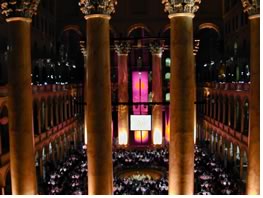 Thirteen
indeed proved a lucky number for the American Architectural Foundation
(AAF) as they hosted the 13th annual Accent on Architecture: A Celebration
of Design Excellence gala Friday, March 1, at the historic National Building
Museum in the nation's capital. Harold L. Adams, FAIA, chair of the AAF
Board of Regents, offered a welcome to the some 800 architects, associates,
friends, and well-wishers on hand to honor some of the finest people—and
buildings—the architecture profession has to offer. He thanked the
gala's sponsors, notably principal benefactor the McGraw-Hill Construction
Information Group, and benefactors CNA and Victor O. Schinnerer &
Company and the Otis Elevator Company.
Thirteen
indeed proved a lucky number for the American Architectural Foundation
(AAF) as they hosted the 13th annual Accent on Architecture: A Celebration
of Design Excellence gala Friday, March 1, at the historic National Building
Museum in the nation's capital. Harold L. Adams, FAIA, chair of the AAF
Board of Regents, offered a welcome to the some 800 architects, associates,
friends, and well-wishers on hand to honor some of the finest people—and
buildings—the architecture profession has to offer. He thanked the
gala's sponsors, notably principal benefactor the McGraw-Hill Construction
Information Group, and benefactors CNA and Victor O. Schinnerer &
Company and the Otis Elevator Company.
On this special night, we need to reflect on how the terrorist attacks on this country changed the way we view buildings and our communities and how we will memorialize September 11 in physical form, Adams told the audience, "and may God bless our efforts."
AIA President Gordon H. Chong, FAIA, added his welcome: "I'm sure I speak for all architects when I say that his occasion brings into sharp focus the power of our work." Those being honored tonight are the risk-takers who have engaged the world around them, Chong explained. "We all must be faithful stewards of our environment—it's our greatest challenge," he reminded the audience.
Master of Ceremonies Robert Siegel, co-host of National Public Radio's "All Things Considered," joked that with their mission to help people understand the importance of architecture in their lives, the AAF was subversive: "The foundation wants me to take responsibility for the way the environment works and looks," he said. Too often we ignore the importance of excellence in our lives, Siegel said, and from now on, he intends to "make more demands."
Siegel offered commentary on how the September 11 terrorist attacks have changed the way he personally and, indeed, the public at large look at the built environment. He described how people have felt deeply the "hard adjustment to the new environment, from the buildings no longer in existence, to "views of other buildings that have become apparent." It is obvious that the World Trade Center's Twin Towers were selected as targets because they were symbols of American identity, Siegel said, yet "after September 11, no building seems invisible." Our responses must be empowering, not reactionary, he concluded.
Prestigious honors presented
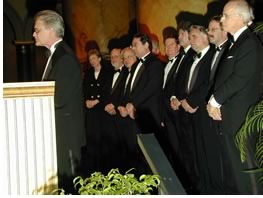 The
AIA 2002 Architecture Firm Award was presented by Chong to Thompson,
Ventulett, Stainback and Associates, Inc. Atlanta. Siegel characterized
the firm as "standard-bearers of architectural excellence,"
and the audience, judging by their standing ovation, wholeheartedly agreed.
"The award is truly received with humility and respect for all the
past recipients," said TVS President Roger L. Neuenschwander, AIA,
spokesperson for the group. He described TVS as a firm that "loves
to collaborate." The firm's success, Neuenschwander explained, is
the result of hundreds of people working together: "We know all of
our work was accomplished through the hands of many."
The
AIA 2002 Architecture Firm Award was presented by Chong to Thompson,
Ventulett, Stainback and Associates, Inc. Atlanta. Siegel characterized
the firm as "standard-bearers of architectural excellence,"
and the audience, judging by their standing ovation, wholeheartedly agreed.
"The award is truly received with humility and respect for all the
past recipients," said TVS President Roger L. Neuenschwander, AIA,
spokesperson for the group. He described TVS as a firm that "loves
to collaborate." The firm's success, Neuenschwander explained, is
the result of hundreds of people working together: "We know all of
our work was accomplished through the hands of many."
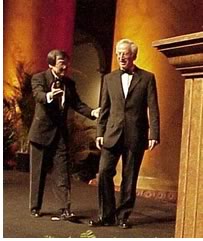 The
AIA 2002 Twenty-Five Year Award was presented to Fundació
Joan Miró, Barcelona, Spain, by Josep Lluis Sert, Sert Jackson
& Associates, with associate architect Jaume Freixa. As original associate
architect, and architect for the addition, Freixa accepted the award and
told the audience he was dedicating it to the memory of Sert. A beautifully
choreographed video dancing through and around the Miro Foundation capture
the spirit of the architect's vision for all present.
The
AIA 2002 Twenty-Five Year Award was presented to Fundació
Joan Miró, Barcelona, Spain, by Josep Lluis Sert, Sert Jackson
& Associates, with associate architect Jaume Freixa. As original associate
architect, and architect for the addition, Freixa accepted the award and
told the audience he was dedicating it to the memory of Sert. A beautifully
choreographed video dancing through and around the Miro Foundation capture
the spirit of the architect's vision for all present.
Keystone Award: The AAF—and the audience with a standing ovation—presented its Keystone Award to the Honorable Joseph P. Riley Jr., Hon. AIA, mayor of Charleston, S.C., for the past 26 years and cofounder of the Mayors Institute on City Design. The Keystone Award "honors an individual from outside the architecture and design field for exemplary leadership that advances the Foundation vision of a society in which everyone uses architecture to enrich their lives and transform their communities."
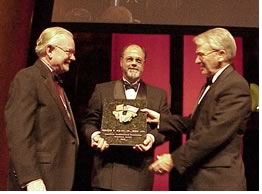 "I
feel so very fortunate to have had the opportunity to make a beautiful
city even more beautiful," Riley said. Yet, he explained, perhaps
we have spent too much time pursuing excellence in the private realm,
where the events of September 11 have proven to us that we need now to
devote more of our energies to creating "an emotional public zone."
"I
feel so very fortunate to have had the opportunity to make a beautiful
city even more beautiful," Riley said. Yet, he explained, perhaps
we have spent too much time pursuing excellence in the private realm,
where the events of September 11 have proven to us that we need now to
devote more of our energies to creating "an emotional public zone."
Riley told the audience that we need to consider designing our cities for citizens who don't travel coast-to-coast or around the globe, but whose very world is one city, one urban experience. The nation's health, he concluded, "depends on creating beautiful and livable communities and towns."
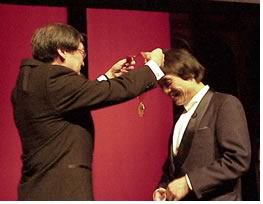 Jewel
in the crown: Ando's Gold Medal
Jewel
in the crown: Ando's Gold Medal
Chong had the distinct honor of presenting the AIA
2002 Gold Medal to Tadao Ando, Hon. FAIA, internationally renowned
Japanese architect, who received his prize to a long and enthusiastic
standing ovation from the audience. Speaking through an interpreter, Ando
thanked the Institute and said he was "deeply honored to receive
this award from my architectural colleagues." He spoke of the importance
of sharing knowledge about the importance of architecture with the next
generation and said that as we begin the 21st century, our greatest challenge
will be to consider how the burgeoning population "will live and
work together in our cities."
Like the speakers before him, Ando spoke of how the terrorist attacks of September 11 had shaken him, and changed forever our attitude towards architecture. If nothing else, he concluded, September 11 has given us a good chance "to think about how we all can live on this planet together."
Copyright 2002 The American Institute of Architects. All rights reserved.
![]()
|
Photos by Douglas E. Gordon, Hon. AIA. |
|